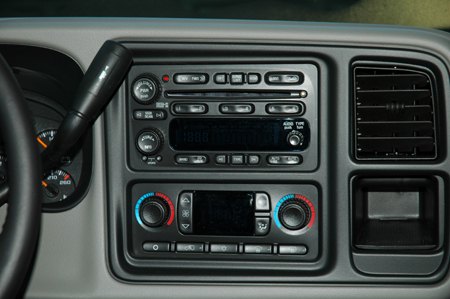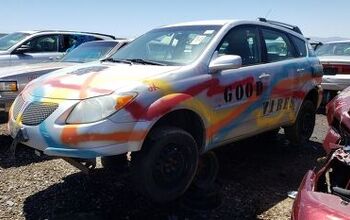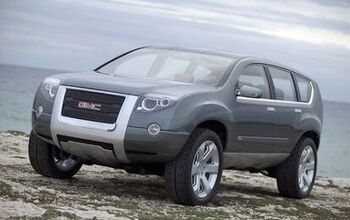General Motors Death Watch 17: Forgive and Forget?
Rex Raider recently ranted about The General's sales doldrums on GMinsidenews.com. The senior camp follower recognizes that hundreds of thousands of [former] GM customers wouldn't buy a GM car if it came complete with an employee discount, cash back, zero percent finance and free health care (no co-pays and dental). Raider posed a simple question: what would it take to win these buyers back?
The obvious answer is great product. But it isn't the right one. Even if GM built cars, trucks and SUV's that looked like sex, never broke and cost twenty dollars, most Americans wouldn't put them on their shopping list. That's because the average person (not you) is almost entirely risk aversive. When they purchase a product– whether it's a baked potato to a Pontiac G6– they're not looking for a Bigger Better Deal. They're not looking for a fantastic new taste sensation or the world's best car. They simply don't want to experience LESS pleasure than they did before. They don't want to lose.
[BTW: this dynamic explains GM's favorable survey scores and loyal customer base. If a GM owner is accustomed to lower quality plastics or poor reliability, they're delighted by incremental improvements, even if the changes don't bring the car up to competitive standards. And despite any unpleasant experiences, they won't risk moving brand.]
And lose they have. Even without considering the vagueries of image and style, GM customers have been stranded by the road, bilked at the service department and empty-pocketed at trade-in time. In fact, GM horror stories stretch all the way back to 1967, the year The General substituted plastic for chrome and generally lost the plot. Even more alarming, despite Mr. Raiders' protestations, some of these tragic tales are as recent as last week. In any case, whenever someone buys a GM product and discovers that it's worse than their previous car, they've lost pleasure (a.k.a. experienced pain). The association is burned deep into their psyche. They will not risk losing again.
To get disaffected customers back into the GM fold, one of two things has to occur. Either the potential customer's current, non-GM car (or service department) has to traumatize them or someone has to eliminate the risk of GM ownership. Obviously, there's not a lot of chance that non-GM brands are going to inflict duff vehicles or bad service on their customers. Which leaves GM one option: to create a risk-free ownership experience.
Audi did it when unintended acceleration puts the brakes on their entire operation. Mitsubishi did it when no one knew their name. So did Hyundai. Hello? GM? Where's your guaranteed buy-back deal, 10-year 100,000 mile warranty or risk-free trial period? While GMAC does right well by selling extended warranties, it's robbing Peter (dealer sales) to pay Paul (finance company profits). A direct and uncomplicated committment to a superior ownership experience would be costly, but it would work miracles for GM's long-term future. At the same time, GM must drive home the point that customers will not– CAN not– lose with a GM product. Lee Iaccoca understood the power of a public, personal guarantee. Rick Wagoner and Bob Lutz do not.
To fully restore sales, GM must also sell to younger drivers who are naturally less risk aversive and/or have never lost on a GM machine (if only because they never owned one). Creating gotta-have products that look nothing like Dad's Buick is the way forward. The Solstice is a perfect example. As good as they are, the Cobalt and Malibu are not. In this arena, GM needs game changers, not reasonable alternatives. Again, the company must draw a line in the sand and tell people that they're never, ever going back to where they were in terms of image, design, quality, performance and service.
Unfortunately, GM has a nasty habit of dropping the ball. There's an increasing number of interesting GM products that fail at the final hurdle because of tepid design (G6), shoddy build (Impala), poor materials (HHR), over-pricing (SSR) and delivery problems (Solstice, 9-7x). GM needs to sort out its fundamentals first. If they jump in too soon with shoddy product or service, a consumer risk elimination strategy will make things worse. For example, if the Solstice runs into quality issues, if Pontiac dealers gouge or otherwise mistreat new GM customers, these buyers will also have that 'never again' moment. GM will lose another generation of potential buyers.
In short, until and unless GM builds great cars AND makes GM ownership a relatively risk-free proposition, hundreds of thousands of fine examples of Rex Raider's favorite brand will continue to languish in dealer lots and airfields.
More by Robert Farago
Latest Car Reviews
Read moreLatest Product Reviews
Read moreRecent Comments
- Analoggrotto I'd feel proper silly staring at an LCD pretending to be real gauges.
- Gray gm should hang their wimpy logo on a strip mall next to Saul Goodman's office.
- Analoggrotto I hope the walls of Mary Barra's office are covered in crushed velvet.
- Mikey For 36.4 years i punched the clock at GM Canada.. For the last 15.5 years (frozen at 2008 rates) my GM pension shows up in my account. I flirted with Fords for a couple of years but these days I'm back to GM vehicles and still qualify for employee price. Speaking as a High School drop out ..GM provided myself and family a middle class lifestyle.. And still does .. Sorry if i don't join in to the ever present TTAC ..GM Bash fest
- Akear Does anyone care how the world's sixth largest carmaker conducts business. Just a quarter century ago GM was the world's top carmaker. [list=1][*]Toyota Group: Sold 10.8 million vehicles, with a growth rate of 4.6%.[/*][*]Volkswagen Group: Achieved 8.8 million sales, growing sharply in America (+16.6%) and Europe (+20.3%).[/*][*]Hyundai-Kia: Reported 7.1 million sales, with surges in America (+7.9%) and Asia (+6.3%).[/*][*]Renault Nissan Alliance: Accumulated 6.9 million sales, balancing struggles in Asia and Africa with growth in the Americas and Europe.[/*][*]Stellantis: Maintained the fifth position with 6.5 million sales, despite substantial losses in Asia.[/*][*]General Motors, Honda Motor, and Ford followed closely with 6.2 million, 4.1 million, and 3.9 million sales, respectively.[/*][/list=1]





































Comments
Join the conversation